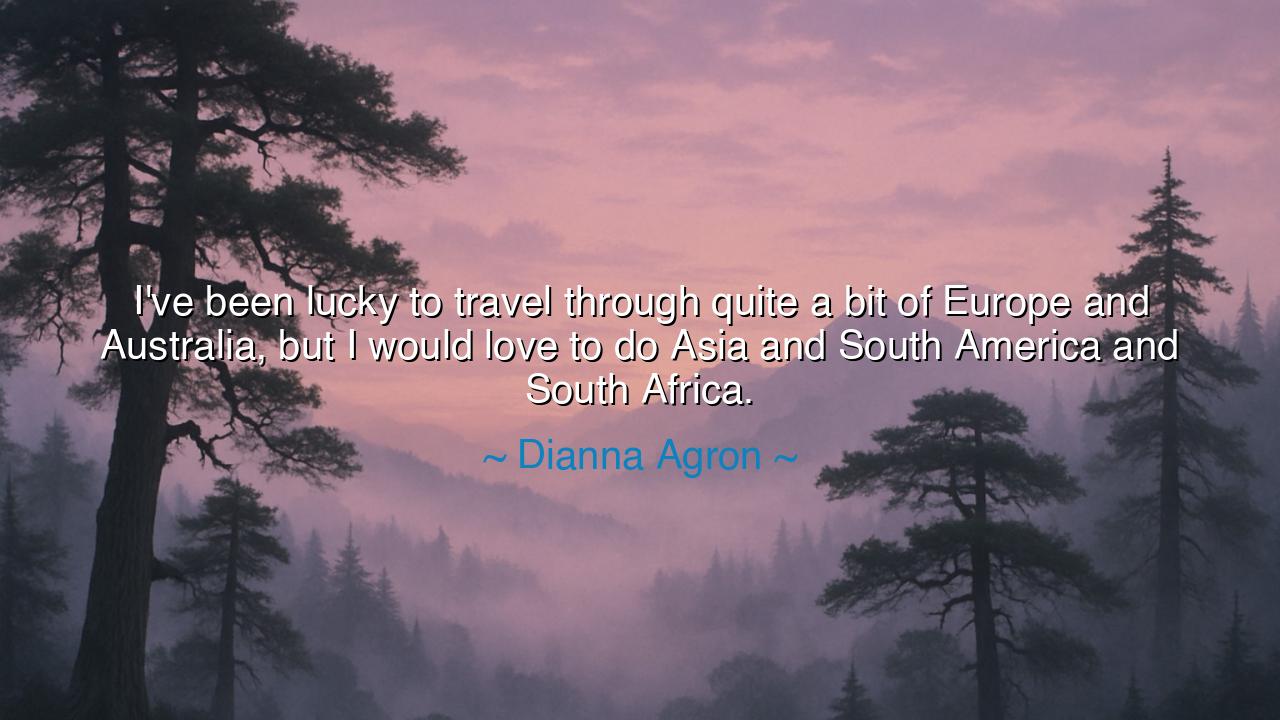
I've been lucky to travel through quite a bit of Europe and
I've been lucky to travel through quite a bit of Europe and Australia, but I would love to do Asia and South America and South Africa.






The words of Dianna Agron — “I’ve been lucky to travel through quite a bit of Europe and Australia, but I would love to do Asia and South America and South Africa.” — are not merely the reflections of a wanderer, but the cry of the eternal human spirit that longs for discovery. In her words we hear the ancient call of the soul: to seek beyond one’s borders, to encounter the unknown, to stretch the heart across oceans and continents until it learns the vastness of creation. For to travel is not only to move the body, but to expand the mind, and to awaken the spirit.
The ancients have always known that the path of the traveler is the path of wisdom. To walk only in the soil of one’s birth is to see the world through a narrow window; but to set foot in distant lands is to see through countless windows, and to discover that truth is too great to belong to one people alone. Thus Agron speaks of her blessings — the fortune of seeing Europe, the wonder of Australia — yet she yearns for more: the mysteries of Asia, the rhythms of South America, the depths of South Africa. Her longing is the longing of humanity itself, restless until it embraces the fullness of the world.
History gives us vivid examples of this longing. Recall Herodotus, the father of history, who wandered from Greece to Egypt and beyond, seeking to record the customs of many peoples. His writings endure not because he glorified only his homeland, but because he sought to learn from others. Each land he entered was a mirror reflecting some portion of humanity, and through his journeys he taught that wisdom lies in diversity. So too does Agron’s desire remind us that every continent holds treasures of knowledge, beauty, and story — waiting for the humble traveler to receive them.
But travel is not only about outward discovery; it is about inward transformation. The man who sees only his own land thinks his way is the only way. But the woman who walks in Asia, who listens to the songs of South America, who gazes upon the plains of South Africa, returns not the same as she left. She returns softened, broadened, enriched — her prejudices loosened, her compassion deepened, her imagination fired by the greatness of the world. In this sense, to travel is to break down the walls within oneself, and to allow the universe to write new chapters upon the heart.
Yet let us not mistake this yearning as mere indulgence. To journey far is to undertake discipline, for it requires humility. The traveler must learn to be a guest, to respect customs, to bow before the wisdom of others. Great harm has come when men traveled only to conquer, when explorers became oppressors, when visitors forgot reverence. But when travel is done with gratitude, with openness, with reverence for the lands and peoples encountered, it becomes not conquest but communion. This is the nobility hidden within Agron’s words: a hunger for communion with the broader family of mankind.
The lesson for the generations is clear: do not bind your soul to one narrow place. Even if you cannot cross seas, seek the spirit of travel in your own life — learn the languages of neighbors, read the stories of distant peoples, open your heart to what is unfamiliar. Let your mind be a traveler, even when your feet cannot be. And if fortune grants you the means to roam, do so not for vanity, but for wisdom, for empathy, for the sacred duty of broadening your heart.
In practice, let each listener take action: step beyond the familiar in some way each day. Taste the food of another culture, listen to the music of another land, greet the stranger as if he were kin. If you can travel, do so with humility, remembering you are a guest upon another’s soil. If you cannot, let books, art, and friendships be your passage into new worlds. In this way, you will discover that all humanity is your family, and the whole earth your dwelling place.
Thus Dianna Agron’s words rise from personal longing to eternal truth: that the spirit of man is not meant to dwell in isolation, but to roam, to connect, to embrace the many faces of creation. To travel outward is to journey inward, and to journey inward is to discover the sacred truth — that beneath the endless variety of lands and peoples, all are united in the great dance of life.






AAdministratorAdministrator
Welcome, honored guests. Please leave a comment, we will respond soon